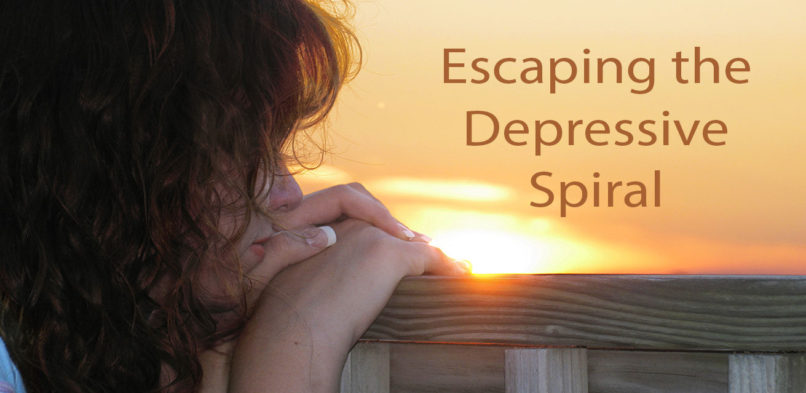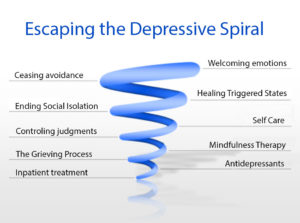Escaping the depressive spiral (Part #2)

Escaping the depressive spiral (Part #2)
December 2, 2016 Comments Off on Escaping the depressive spiral (Part #2)So much of the psychological and medical community today speaks of, “Managing your anxiety and depression.” Think about that phrase for a moment. The implication of it is that, if you struggle with the spiral of anxiety and depression discussed in the last article, you are destined to continue to do so – permanently.
(By the way, this the second part of a two part article. If you have not read the previous post, please read it first!)
If this were the opinion of a few fringe thinkers, it would be one thing – but, that sort of disempowering vocabulary is the norm. The message is pretty simple: “You’re sick and will need constant treatment – from an expert healer who can maintain you and keep you functioning.”
Now, obviously, any mood disorder is a serious matter and does require intervention – often from both medical and psychological sources as well as spiritual, nutritional, physical/exercise and even meditative practitioners. And, no, there is no silver bullet and no quick and easy set of cognitive tricks that will magically make it all go away.
But, the flip side of it is that reactive mood disorders also don’t have to be chronic, lifetime-managed conditions that leave you forever dependant on drugs or therapy either! If the last article makes nothing else clear, it should very strongly demonstrate how powerful our mental behaviours are in destroying our mental well being.
If you learned those mental and emotional behaviours, then you can also learn much more powerful mental behaviours to not just manage them, but to permanently replace them!
Before we go there though, a word of caution:

It would be irresponsible for me not to make it very clear that, if you are anywhere past step 8 (the depression phase) of this spiral, please recognize that you almost certainly first need medical help.
And, quickly!
Please understand that when a mood disorder takes you to the place where you are considering ending your own life, it is an emergency. You almost certainly will need medical treatment and, very possibly, antidepressant medication.
Please don’t tune out. Yes, I know antidepressants do not cure mood disorders, but they can powerfully ease the pain of them and swiftly restore the significant mental energy that is needed to do the psychological work that reverses this spiral.
Yes, I’m also fully aware that antidepressants are nothing more then a psychological Band-Aid, but, considering that the Band-Aid is really one of the most effective medical devices ever created, that’s not a bad category for them to be in. Research consistently shows that the people who make the greatest psychological progress towards permanently healing mood disorders are almost always, temporarily, supported by their doctor by way of some form of psychoactive medication so they have the resources present to do the work they need to do.
Please feel very free to book an appointment with me – and please also book the very earliest appointment you can get with your family doctor or even just the nearest walk-in clinic and tell him or her everything!
Psychological counselling to treat a mood disorder: (Mapping out the journey)

No one chooses these patterns of thinking – we are taught them and/or not taught the opposite skills by our families. Counselling is a place to learn new skills, process long buried emotions and develop new strategies for coping with life and our thoughts and beliefs.
Obviously, this article is never going to be a substitute for psychological counselling – but, hopefully, it at least can demystify the process and eliminate fear of the journey. (Hopefully, it can also cancel the stereotypical fears about how therapy is nothing more then spending years paying to talk about your mother…)
(Note: Click image to expand.)
Learning to work with (instead of fighting against) your emotions:
One of the most controversial but important understandings about the depressive spiral is the realization that the entire spiral starts with the avoidance of real emotion and, thus, functions in an addictive manner. Jung is famous for his recognition that, under every neurosis lies the avoidance of legitimate suffering. (While no-one uses the term any more, mood disorders were classed as neurotic behaviours.)
Learning about how and why the human heart avoids pain is a critical first step for developing skills to face, learn from and create meaningful change in the face of emotional distress and they are essential in crippling the power of both anxiety as well as depression/suicidal Ideation. It’s a hard area to face though – and takes considerable time. Pain, in and of itself, is difficult to face – and then, most attempt to simultaneously face it and the pain of loneliness as well. It’s almost impossible to separate this first step from the recognition of the power of social isolation.
Eliminating isolation and loneliness:

In general, mood disorders isolate people. For many strugglers, their weekly counselling session is their only human contact – that’s not good enough. Faith communities, support groups and other groups can help temporarily but a big part of early mood disorder treatment involves facilitating reengagement with a social network – which is always a better long-term solution. It’s also about finding ways to make the reengagement as successful as possible in terms of creating a safe space for sharing our emotional worlds thereby significantly reversing the patterns of suppression that create anxiety and panic.
Learning to manage thinking:
Once that understanding and social support system is in place, the next steps involve learning skills in the awareness of and management of your thought life and an understanding of the grieving process.
Think of it sort of as basic training in mental hygiene. You shower every day – the human mind also needs a daily cleaning. As the Alcoholics Anonymous program observes, “You are only as sick as the secrets you keep.” The things we deny and suppress are secrets we are are really trying to hide from ourselves. The exhaustion and frustration elements of the depressive spiral are almost entirely caused through dysfunctional thinking processes.

Controlling judgments through mindfulness:
Look at the coffee cup on your desk. Is it:
(1). The greatest art work ever crafted; painted in brilliant colours which captivate the mind?
(2). An ugly, old, chipped, hideously painted, dirty hand-me-down from your mother?
(3). Just a cup?
Notice how you feel if you imagine you were trying to sell someone the above three stories – notice the power our judgments have and the restfulness that is present in simple objectivity and clinical distance from an object, person or event. Self centred contempt, frustration, helplessness and even the initial fear elements of the depressive spiral all are powerfully influenced or completely caused through the power of judgment – and healed through replacing such.
Establishing a practice of self care:
You need to take care of yourself. Decent food, adequate sleep, cardio and resistance based exercise really does matter and no amount of medication will ever take the place of it.
You need time. It takes decades to develop the mental patterns and belief systems that create a mood disorder. It’s going to take more then 20min to learn new ones. Give yourself time, grace and the space to relearn how to handle your world.
You need hope. Realize that the majority of people who have gone through psychological counselling for a mood disorder, eventually, come to feel grateful that they developed it – as the anxiety or depression was finally what it took to get them into counselling where they learned the skills needed to create, for themselves, so much better of a life.
 At each step of this reversed spiral, there are key skills that you can learn to reverse the spiral and reclaim your power to change your life.
At each step of this reversed spiral, there are key skills that you can learn to reverse the spiral and reclaim your power to change your life.
They are not difficult skills to learn – all of us can easily grasp them even as young children.
It’s not your fault that you didn’t learn them – they simply were not taught.
They take work to learn, but it’s so much less work then staying in the mood disorder and coping with the fallout it can have on every part of your life and relationships – to say nothing of the impact they can have on the developing hearts of your children and the power a parent can have in teaching a child very different skills at the earliest ages.
Please read more about anxiety and depression here and reach out for help today!